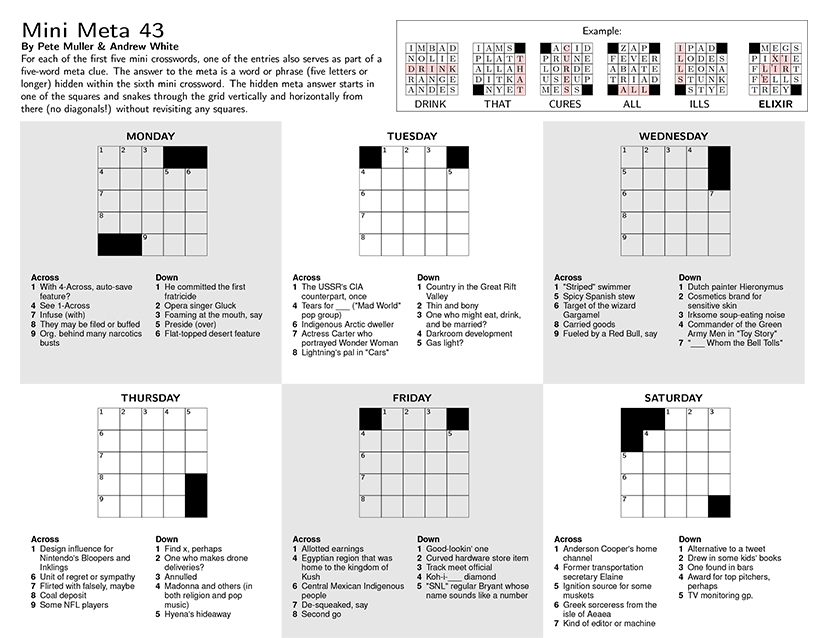Two Alumni Collaborate on Meta Mini Crosswords for The Washington Post
Pete Muller ’85 and Andrew White ’23 invented a new kind of puzzle series
It all started in late 2019, when Pete Muller ’85 mentioned he was looking for an intern.
The Santa Barbara–based singer-songwriter, investment fund founder, and former Princeton math major had a unique side hustle that he wanted help with: constructing crossword puzzles. In his spare time, Muller is an avid cruciverbalist, with his creations appearing regularly in The Wall Street Journal and The Washington Post. And just over two years ago, during a conversation with then-student Tiger Gao ’21 on the student-run podcast Policy Punchline, Muller mentioned he was interested in finding a collaborator to help him brainstorm puzzle clues and themes.
Enter Andrew White ’23.
White, a classics major from the Boston area, had built a reputation on campus as “the crossword guy” by publishing puzzles in each issue of the Nassau Weekly. “We publish on Sundays, which is the crucial part because people would take the crosswords and go to Sunday brunch and solve them with friends,” White says. “I’d get emails from people I’d never met before with pictures of their solved puzzles, saying, ‘I loved this!’”
White got wind of Muller’s search and reached out. “The rest is history,” White says with a laugh.
White began interning with Muller that spring, and together they invented a new kind of puzzle series for The Washington Post: the daily mini meta. The series consists of six 5x5 puzzles, with one puzzle published daily from Monday through Saturday. Each of the first five puzzles includes a “meta” word — a solution word that, when put together with four others, creates a sentence or phrase that serves as a sixth clue. The solution to that sixth clue is hidden in the week’s final puzzle, its letters snaking their way through the grid in a “word search”-like format.
“Brainstorming how to meet those constraints and actually come up with something that works is really fun,” Muller says.
Since it launched in March 2021, the daily mini meta has seen a 350 percent increase in the number of daily solvers. In fact, it was so successful that Muller offered White a full-time position, which White accepted, deferring his junior year at Princeton. The Post has since picked up the series through 2022.
To create the mini meta, Muller and White first have to generate a final solution. Let’s say they’re inspired by the start of baseball season and come up with “umpire.” Then they brainstorm a five-word clue for that solution, such as “they stand near home plate.” Next, White generates clues for all the puzzles, ensuring that each word of the five-word meta clue is included in succession.
“To make a good crossword is to make someone smile when they figure out what’s going on or get a tough clue,” says White, who describes crosswords as the “perfect mixing” of his two loves: trivia and wordplay. “All other writing is presenting something to the reader to consume, but with crosswords, it’s collaborative [with the solver].”
Muller and White cite their different skill sets as a reason their collaboration is so gratifying. White is big on language and puns; Muller is a music lover with a knack for math and business. White offers a youthful sensibility and familiarity with contemporary culture (using “modern gender-neutral pronoun” as a clue for the word “they,” for example); Muller brings extensive knowledge and experience and an older-generation appeal (e.g., referring to the famous French singer for the word “Edith”).
“When you’re trying to [create] something, and you get stuck, you can get into this place in your head where it’s frustrating. And then all of a sudden, someone gives you a different perspective,” Muller says. “That gives you tons of energy and unblocks you. We do that for each other in a great way.”
For example, Muller recalls accidentally using the antiquated spelling for the Thai currency, “bhat,” as a solution in a recent puzzle. Remaking the puzzle using the word’s correct spelling (“baht”) would take hours. He texted White the issue; White suggested changing one letter of the solution word so that it would be the name of a reasonably identifiable — or at least Googleable — rap artist named Bhad Bhabie. Problem solved, and interesting new tidbit learned.
With White back at Princeton this fall, the duo is looking to recruit other like-minded cruciverbalists to join their informal crossword club, where they share work and solicit guidance and mentorship. Ultimately, they hope to find more collaborators for the Post’s daily mini metas. “What we might do with the puzzle at some point is figure out how to make it a little bigger or add some other cool twists to it,” says Muller, noting that the team has rolled out a few software updates to make puzzles easier for less experienced solvers. “It’s like, OK, what’s next? What’s the next challenge?”











No responses yet